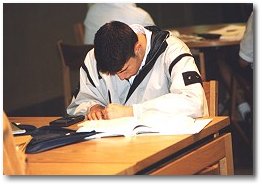The Middle School Humanities curriculum is designed to help the student to achieve a global appreciation of people and society and to further develop the students’ reading, writing, speaking, listening, research, and critical thinking skills. The curriculum offers a series of perspectives from which the student can approach the diversity of human experience. Each year’s study focuses on a set of themes that will allow the student to make connections across cultures, time periods, and academic disciplines in order to broaden his understanding of what it means to be human. Teachers present themselves as generalists who join with students in their quest for knowledge. Meeting two periods a day, Humanities courses intensively develop basic composition and reading skills. Writing instruction focuses on sentences, paragraphs, short essays, poems, and stories. Formal and informal instruction in grammar and usage occurs throughout the curriculum. Study of literature occurs at all grade levels, with special effort to improve comprehension, to increase vocabulary, and to introduce analyses of character, plot, and theme. By the time a student finishes the eighth-grade course, he should have a foundation in both writing and reading that is strong enough to support the advanced work required in the Upper School. Upper School English courses reinforce and expand a student’s ability to read and write. They ask, and teach students to ask, increasingly complex questions about literature of many kinds: poetry, short stories, novels, plays, and essays. While senior electives are organized thematically, courses for underclassmen generally include some literature that complements the Social Studies curriculum as well as other works which appeal to and expand students’ interests. Classes are mostly discussions, although some background material may be presented in lectures. Teachers encourage students to meet ideas first-hand rather than merely learning about them. They should be able not only to articulate their ideas about life but also to support these ideas by cogent reasoning from textual evidence. Students take the English course corresponding to their grade level. For the second and third trimesters of their senior year, students choose electives. These courses allow a student to concentrate on or to expand his interest in literature and to hone his writing. As writers, students complete weekly writing assignments that demand increasing complexity of thought and increasing sophistication of style. These assignments include required revision and regular public scrutiny of students’ writing. In addition, at each grade level in the Upper School, every student writes a departmental essay, a coordinated writing project assigned to all students in a particular grade. The departmental essay for each grade is as follows:
By the end of each year, every student in a particular grade should have written at least one successful departmental essay. The department nominates students for English 10-H, 11-H, and 12-AP. Students who are nominated and who wish to enroll in these courses do so on their Course Selection Sheets. With the written permission of the English Department Chairman, seniors may take additional electives during the second and third trimesters. Seniors may register for certain courses in either the English Department or the Social Studies Department, but not in both.
| Computers | English | Fine Arts | Languages | History | Math | PE | Sciences | ________________________________ |
 The
Lower School Language Arts program emphasizes skills in reading, writing, and
speaking. In first grade, we teach students to put spoken language into written form, and
then we continue to expand and reinforce skills in the areas of composition, handwriting,
and spelling. Students develop into independent readers with good silent reading
comprehension. A phonetic approach to reading and spelling is used primarily but not to
the exclusion of other methods. Language arts classes in second, third, and fourth grades
develop previously taught skills along with a wide range of new skills with continuing
emphasis on reading comprehension, composition (including proof-reading and summarizing),
vocabulary- building, grammar, and spelling. Organizational and study skills are also
emphasized, and throughout the language arts program, children are exposed to good
literature. In fourth grade, we begin our humanities program. This combination of language
arts, social studies, and study skills is developmentally appropriate for the boys, and it
also helps prepare them for further humanities work in Middle School.
The
Lower School Language Arts program emphasizes skills in reading, writing, and
speaking. In first grade, we teach students to put spoken language into written form, and
then we continue to expand and reinforce skills in the areas of composition, handwriting,
and spelling. Students develop into independent readers with good silent reading
comprehension. A phonetic approach to reading and spelling is used primarily but not to
the exclusion of other methods. Language arts classes in second, third, and fourth grades
develop previously taught skills along with a wide range of new skills with continuing
emphasis on reading comprehension, composition (including proof-reading and summarizing),
vocabulary- building, grammar, and spelling. Organizational and study skills are also
emphasized, and throughout the language arts program, children are exposed to good
literature. In fourth grade, we begin our humanities program. This combination of language
arts, social studies, and study skills is developmentally appropriate for the boys, and it
also helps prepare them for further humanities work in Middle School.